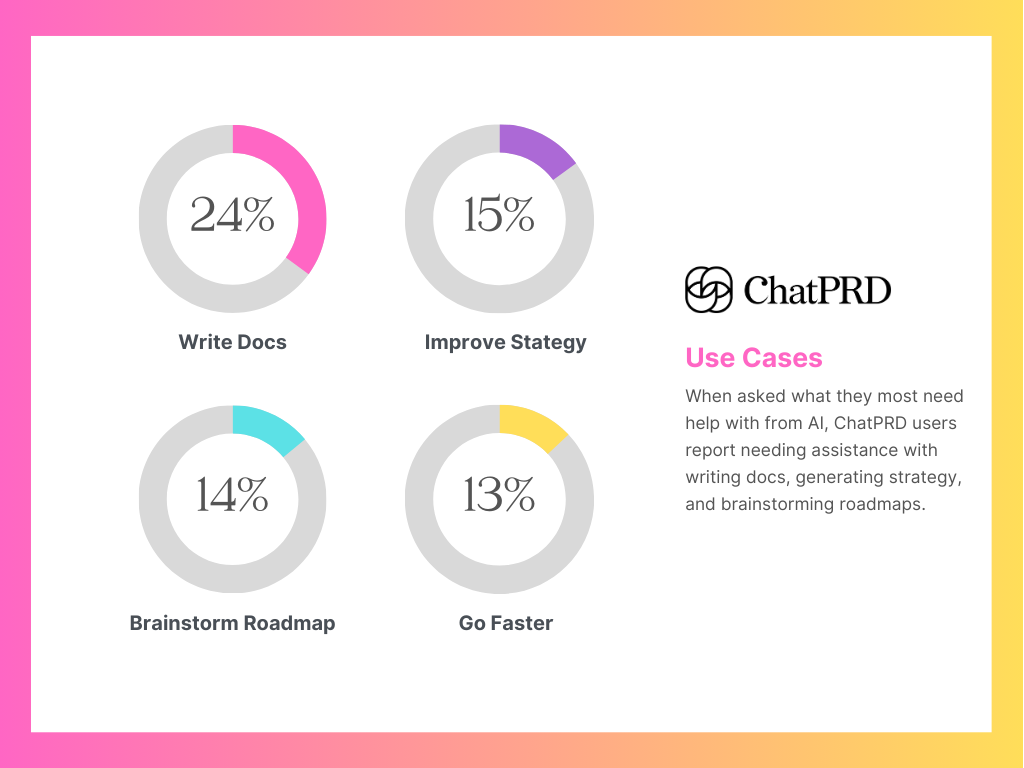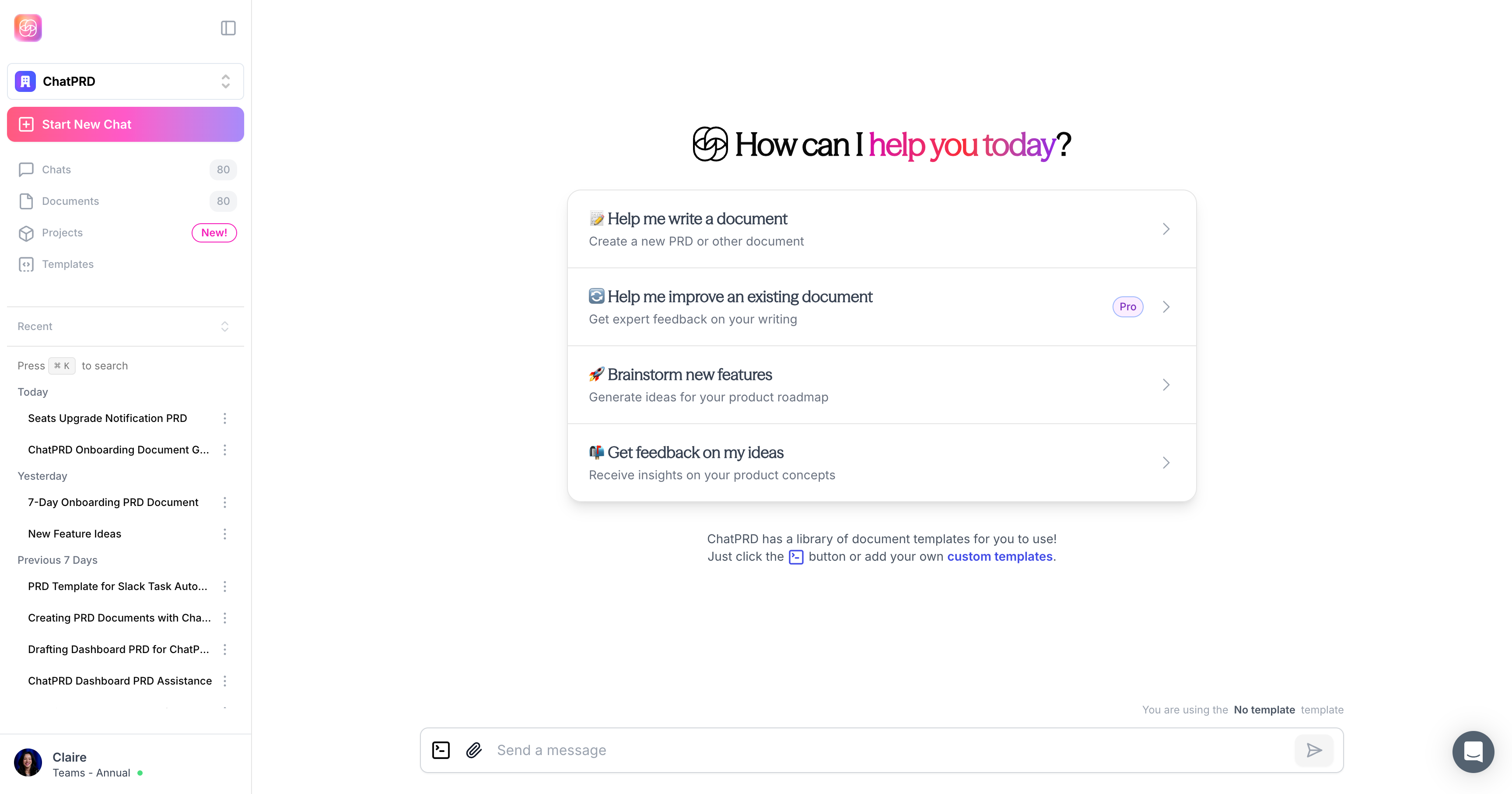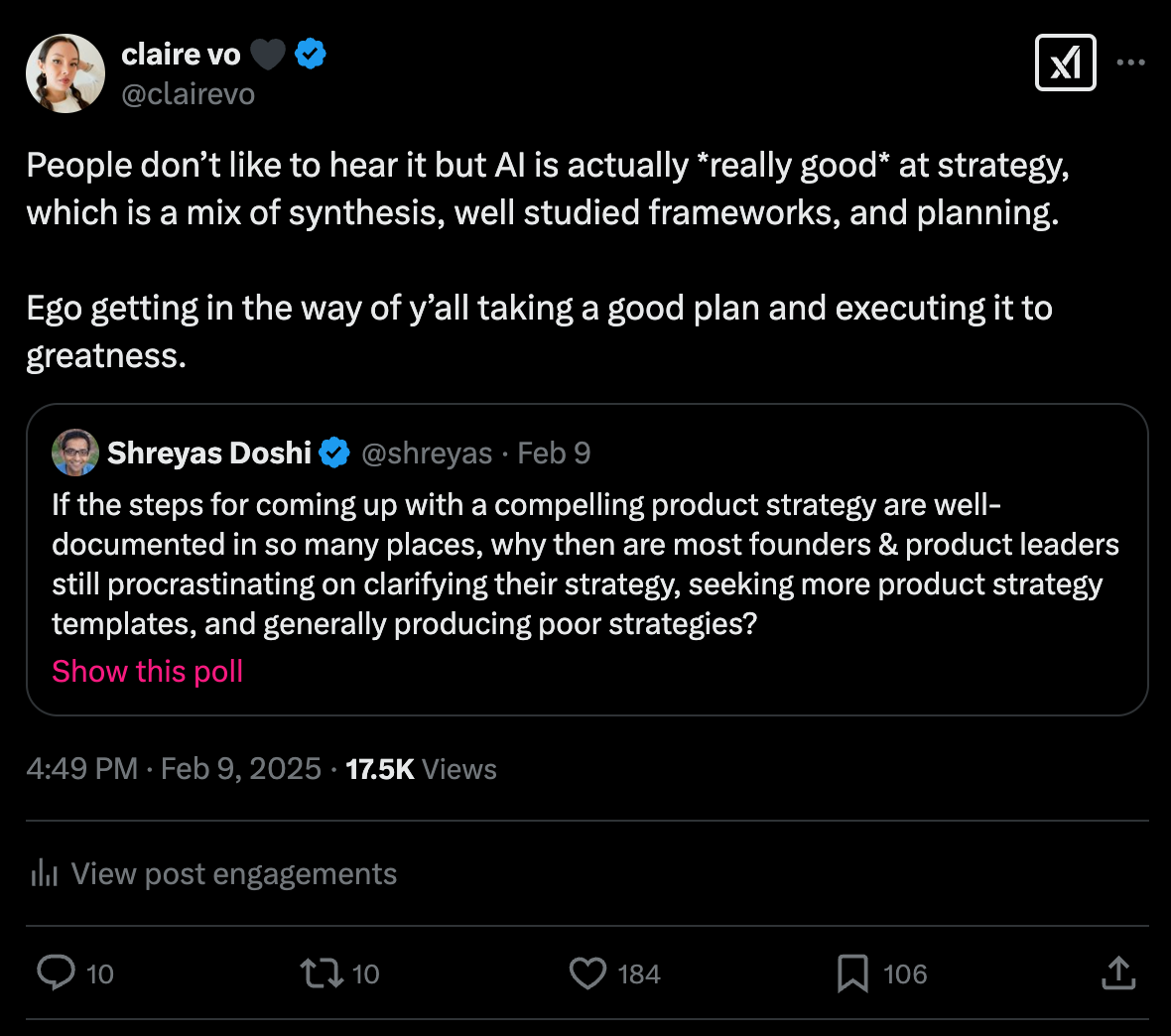Let’s break down some key capabilities and how an AI agent could enhance each:
1. Intelligent Roadmap Planning & Prioritization
Planning a roadmap involves balancing customer needs, business goals, and technical feasibility – a complex juggling act. An AI agent could make this far more data-driven and dynamic.
For instance, AI could analyze usage data, market trends, and even economic indicators to forecast future customer needs and market shifts, enabling proactive adjustments to product roadmaps.
Instead of planning based on gut feeling or static yearly strategies, a PM could get AI-generated projections like, “Feature X is likely to have a surge in demand next quarter based on trend analysis, here are a few ways we can improve that engagement.”
Beyond forecasting demand, an AI agent could assist in feature prioritization. By crunching data from user feedback, support tickets, and product analytics, the agent might highlight which proposed features will deliver the most user value. In fact, some product management platforms (like Aha! or Productboard) are already incorporating AI to do just this – helping assess potential feature impact on customer satisfaction and business objectives.
Imagine your AI copilot suggesting: “Out of 50 feature ideas, these 5 will likely move the needle most for retention, given the data.” This doesn’t mean the AI unilaterally decides the roadmap, but it provides a data-backed starting point, saving PMs countless hours and adding confidence to decisions.

We’re seeing this play out in ChatPRD data, which shows us that 15% of users are leveraging ChatPRD to brainstorm and update roadmaps.
2. User Feedback Synthesis and Insights
Product managers are inundated with user feedback from all sides – surveys, app store reviews, social media, support chats, you name it. It can be a goldmine of insight, but digging through it all manually is super tedious and time-consuming.
An AI agent excels at digesting large volumes of unstructured feedback and finding patterns. For example, AI can perform sentiment analysis and categorization on thousands of customer comments overnight, then present the PM with a concise summary: “Users are mostly happy with the new navigation, but there’s a recurring complaint about the checkout process timing out.”
There are already tools hinting at this capability. Kraftful, for instance, automatically collects and analyzes user feedback from support tickets, social media, and surveys, helping detect important trends “on auto-pilot” – it integrates with platforms like Intercom to make this happen.
An AI PM agent would take this further by synthesizing insights across all feedback channels and even quantifying them (e.g., “20% of recent feedback mentions ‘performance issues’ post latest release”). The agent could then proactively flag urgent issues (a sudden spike in complaints after a feature launch) or suggest ideas for improvement derived from user suggestions.
By turning raw feedback into actionable intelligence, the AI can ensure the voice of the customer is always in the PM’s ear, loud and clear…but not too noisy.
3. Competitor Analysis and Market Monitoring
No product exists in a vacuum. Part of a PM’s job is keeping an eye on competitors and the broader market – what new features are competitors launching? What pricing changes or partnerships are happening in the industry? Here, an AI agent can act as a tireless research assistant, constantly scanning the horizon. AI-powered tools can monitor competitors’ activities, track market trends, and even identify emerging competitive threats.
For example, the agent might scrape competitors’ websites, press releases, app updates, and news articles to compile a daily or weekly briefing.
Instead of sporadic competitive research, the PM would have a real-time feed: “Competitor just rolled out a major update on their mobile app,” or “Three new startups have been funded by YC this month, focusing on AI-powered personalization.” By analyzing this information, the AI could highlight potential implications: “Competitor’s new feature is something users have been requesting from us as well in support chats.”
This allows the product manager to respond quickly – maybe adjusting priorities or preparing a communication to stakeholders about how their product will maintain its edge. Essentially, the AI agent serves as the PM’s eyes and ears in the market 24/7, ensuring no important development goes unnoticed.
4. Workflow Automation and Execution Assistance
Consider how much of a product manager’s day can be consumed by routine coordination and follow-ups: scheduling meetings, updating project statuses, documenting decisions, creating tickets, etc. An AI agent could take on many of these workflow and project management tasks, acting like a super-powered administrative assistant who works 24/7 and never drops the ball.
AI-powered project management tools already show promise here by automating task assignment, progress tracking, and even resource allocation. An agent would add more automation, autonomy, and tool integration to these flows.
In a similar vein, an AI PM agent could automatically update the status of tasks (e.g., move a Jira ticket to the next column based on developer comments), set up reminders for upcoming deadlines, or alert the team about blockers. It can help monitor project timelines, identify bottlenecks, and optimize team workflows, ensuring the product development train stays on track.
Another very tangible example that will resonate with PMs is meeting support. Imagine every meeting or stand-up you have, the AI agent is present (virtually) – recording notes, identifying key decisions, and even distributing action items afterward. AI meeting assistants like Granola already do this: it doesn’t just transcribe the conversation, it highlights key takeaways, action items, and priorities automatically. Imagine this flow, but tailored for the product manager use case with access to all the tools you need to follow up.
Your AI agent could integrate such capabilities so that after a meeting, you instantly have a summary and to-do list waiting in Slack or email. Workflow automation might also include generating draft communications – for instance, drafting release notes or an update email to the leadership based on the day’s developments, which the PM can quickly review and send.
By handling the busywork, the AI frees product managers to focus on higher-level thinking and problem-solving.
5. Documentation and Knowledge Management
Product managers do an awful lot of writing: PRDs, strategy memos, user stories, release notes, and more. An AI agent can become an ever-ready writing partner to speed this up. We already see how generative AI can produce solid first drafts.
Tools like ChatPRD have shown that an AI can take a rough idea or outline from a PM and quickly draft a detailed Product Requirements Document around it.

You can prompt ChatPRD with something like “Write a PRD for a new feature that allows users to import data from Google Sheets” and get a well-structured draft in moments. ChatPRD is described as an “on-demand Chief Product Officer” that produces high-quality PRDs and even gives PMs feedback on their writing.
We’ll be taking this further soon, with proactive drafting, ticket creation, and more.
Beyond PRDs, AI PM agents could act as a living knowledge base. It could recall any detail from past documents or conversations instantly. If you ask, “What was the rationale for the pricing change we discussed last month?”, the agent can pull up the relevant meeting notes or Confluence page and even summarize the reasoning. This capability is enhanced as the agent integrates with company knowledge systems. With the agent’s help, documentation stays up-to-date and accessible. It might even proactively suggest updates – “It’s been a year since the FAQ was updated; based on recent support questions, here are a few Q&As to add.”
By streamlining documentation and keeping institutional knowledge at the PM’s fingertips, the AI agent ensures information is never a bottleneck.
6. Strategic Insight and Ideation Support
Great product management is not just reactive; it’s also proactive and creative. An AI agent like ChatPRD can serve as a strategic sounding board. For instance, during product discovery or brainstorming sessions, the AI can generate ideas by analyzing market gaps, customer pain points, and emerging technology trends.
It might suggest, “Have you considered a feature for ____, since many users in your target market struggle with that according to online forums?” These suggestions can spark the team’s creativity or uncover opportunities the team hadn’t thought about.
AI is particularly well suited for this kind of strategy work, as our founder Claire has discussed in depth on X.

AI can also simulate scenarios to inform strategy. Want to know how a pricing change might affect user churn or how a feature might perform with a different user segment? The agent could use available data to model scenarios or at least provide historical analogies (“In 2021, when a similar product in our industry introduced a freemium tier, their user growth accelerated by X%”). Such insights help PMs in strategic planning and in making a case for their decisions with data.
Over time, as the AI ingests more of the product’s data and outcomes, its recommendations could get more sophisticated – even pinpointing leading indicators for success or failure of a product initiative that a human might miss.
This is just the beginning of what AI product management agents can do
In short, the ideal AI PM agent wears many hats: analyst, note-taker, research librarian, copywriter, project coordinator, and strategist. Crucially, it does so in a way that augments the product manager’s own skills and knowledge. This isn’t even touching on adjacencies like design, code, and marketing.
All these capabilities interlink to give the PM something like a “virtual team member” who works 24/7, doesn’t get tired, and is intimately familiar with the product and its ecosystem.
Speaking of ecosystem, up next: what integrations an AI product manager agent will need.
